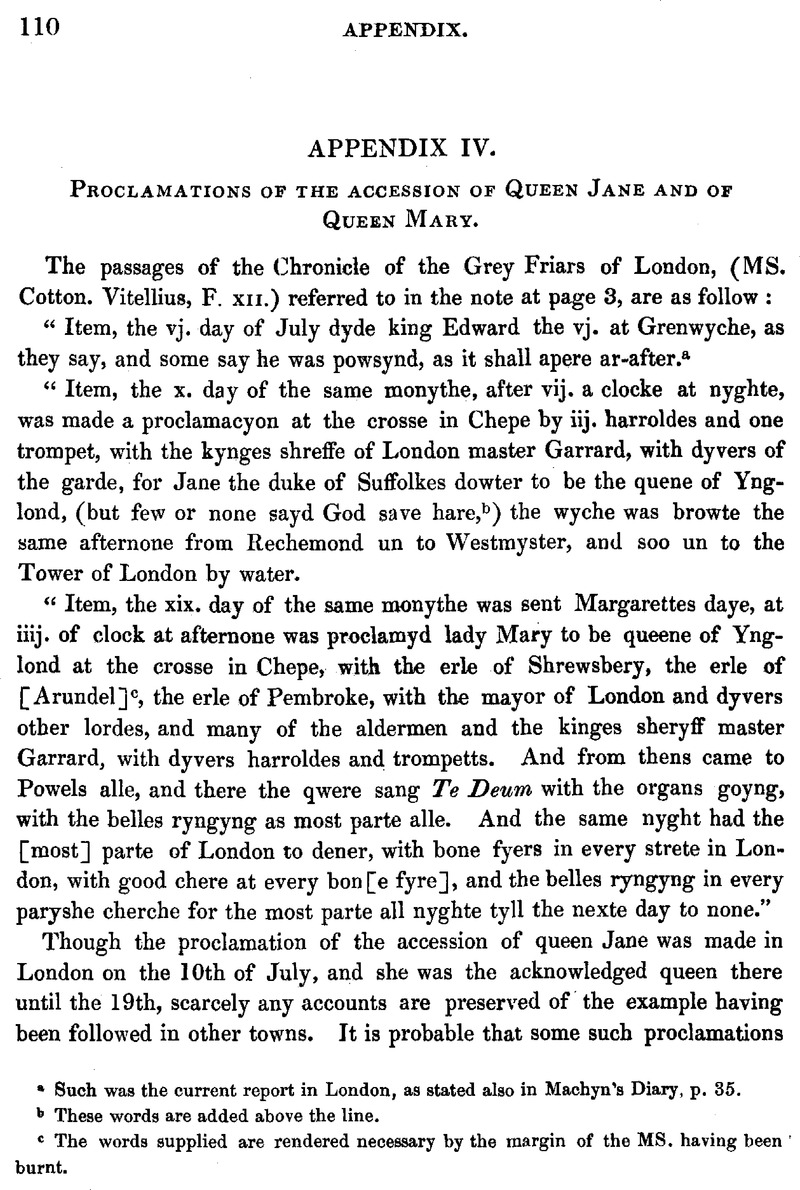No CrossRef data available.
Article contents
IV. Proclamations of the accession of Queen Jane and of Queen Mary
Published online by Cambridge University Press: 23 February 2010
Abstract

- Type
- Appendix
- Information
- Copyright
- Copyright © Royal Historical Society 1850
References
page 110 note a Such was the current report in London, as stated also in Machyn's Diary, p. 35.
page 110 note b These words are added above the line.
page 110 note c The words supplied are rendered necessary by the margin of the MS. having been burnt.
page 111 note a On Saturday the 15th of July Richard Troughton, dining at the George at Grantham, “met with Frenyngham; and I demaunded of hyme from whence he came, and he tolde me from Barwike, wher he had byne to proelame lady Jane.” Narrative printed in the Archæologia, xxiii. 36.
page 111 note b The lord Robert Dudley, queen Jane's brother-in-law, proclaimed her at King's Lynn, as appears by an ancient roll of the mayors: “1553. George Rewley. This year the lord Roberte Dudley came to Linn, and proclaymed the lady Jeanne queene; and afterwards he was carried to Framingham before queene Mary.” (Extract communicated by Daniel Gurney, esq. F.S.A.) In Richards's History of that town, pp. 694, 1193, this fact is mentioned, but lord Robert Dudley is miscalled lord Audley. His presence in that part of the country was owing to his marriage. His first wife, as is well known, was Amy, daughter of sir John Robsart. In Dec. 1550 the stewardship of the manor of Castle Rising and the constableship of the castle there (which is in the vicinity of the town of Lynn), were granted to sir John Robsart and sir Robert Dudley, and the longer liver of them. Strype.
page 111 note c Original Papers of the Norfolk and Norwich Archæological Society, vol. i. p. 145.
page 111 note d Manship's History of Great Yarmouth, edited by C. J. Palmer, esq. F.S.A. 4to. 1847.
page 112 note a Morant's History of Colchester, p. 50.
page 112 note b Edited by Sir Fred. Madden in the 23d volume of the Archælogia, from the Harl. MS. 6222.—Some other papers about Troughton's business exist in the State Paper Office, being the depositions of Thomas Sklater alias Thomson, and Thomas Wymberley. It is worthy of remark that the person frequently mentioned by Troughton in his narrative as “my master,” was sir William Ceeill.
page 113 note a Coventry MS. annals. See further extracts in p. 125.
page 113 note b The minutes of the corporation of York have been kindly examined for me with a view to this inquiry, by Robert Davies, esq. F.S.A. late town clerk of that city.
page 114 note a Hist, of Shrewsbury, by Blakeway and Owen, vol. i. p. 350.
page 114 note b Archæologia, vol. xxviii. p. 119.




